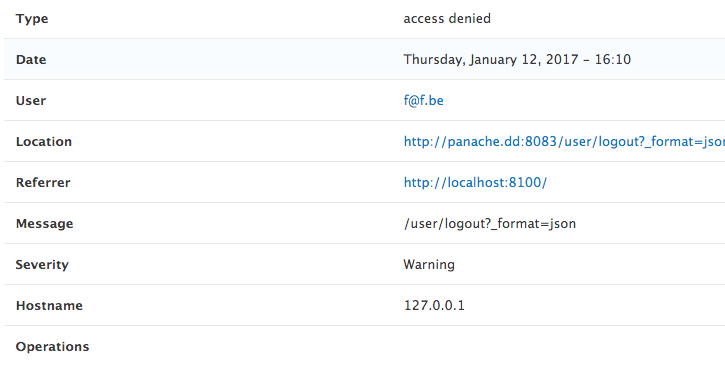I'm creating a mobile app in Ionic (which uses Angular). I've set up a D8.3-dev BE which will hold the users and their data.
I've figured out how to register as an anonymous user (this is why I'm using D8.3-dev because this functionality is introduced here) and wrote a blog post about it (https://fonsvandamme.be/en/blog/how-create-user-rest-drupal-8).
Logging in also works after I registered a user.
This is how I login:
/*
* Login User with username and password.
*/
login: function (email, password) {
var defer = $q.defer();
$http({
method: 'POST',
url: config.endpoint + '/user/login?_format=json',
data: {
name: email,
pass: password
},
})
.success(function (data, status, headers, config) {
// Store the CSRF token.
localStorage.set('csrf_token', data.csrf_token);
// Store the Logout token
localStorage.set('logout_token', data.logout_token);
// Set the user object.
localStorage.setObject('user', data.current_user);
defer.resolve(data);
})
.error(function (data, status, headers, config) {
defer.reject(data);
});
return defer.promise;
},
When logging in I receive the following:
current user object, a csrf_token and a logout_token.
When I use these tokens to logout (I tried a lot of different ways already:
/*
* Logout User.
*/
logout: function () {
var defer = $q.defer();
$http({
method: 'POST',
url: config.endpoint + '/user/logout?_format=json&token=' + localStorage.get('csrf_token'),
dataType: 'json',
})
.success(function (data, status, headers, config) {
defer.resolve(data);
// Go to the login page.
$state.go("login");
})
.error(function (data, status, headers, config) {
defer.reject(data);
});
return defer.promise;
},
I keep getting the following error:
{"message":"\u0027csrf_token\u0027 URL query argument is invalid."}
So it seems the crsf_token I use from logging in isn't correct.
What am I doing wrong or overseeing here?
EDIT: after testing a lot and trying it seems like I need to use get. I use this code now for logout but I still get a 403:
/*
* Logout User.
*/
logout: function () {
var defer = $q.defer();
$http({
method: 'GET',
url: config.endpoint + '/user/logout?_format=json',
headers: {
'X-CSRF-Token': localStorage.get('csrf_token'),
'Authorization': 'Basic xxxxxxxxx',
},
})
.success(function (data, status, headers, config) {
defer.resolve(data);
})
.error(function (data, status, headers, config) {
defer.reject(data);
});
return defer.promise;
},
Here is what the Drupal 8.3-dev BE returns, it seems like it recognizes the user I want to log out but it's still throwing the 403.

